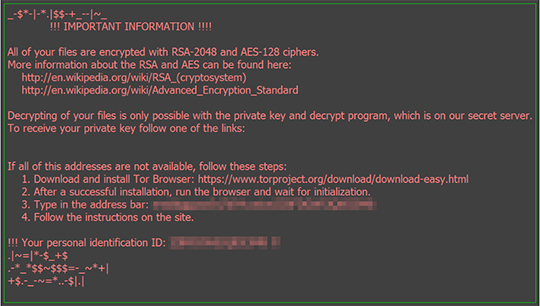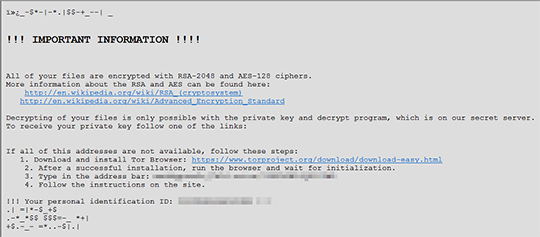RANSOM_LOCKY.DLDTAQP
Ransom.Locky!g23 (Symantec); Ransom:Win32/Locky!rfn (Microsoft); Ransom.Locky (Malwarebytes); Trojan-Ransom.Win32.Locky.wcz (Kaspersky)
Windows


Threat Type: Trojan
Destructiveness: No
Encrypted: Yes
In the wild: Yes
OVERVIEW
This Trojan may be downloaded by other malware/grayware from remote sites.
It does not have any propagation routine.
It does not have any backdoor routine.
It connects to certain websites to send and receive information.
TECHNICAL DETAILS
Arrival Details
This Trojan may be downloaded by the following malware/grayware from remote sites:
- JS_LOCKY.DLDSAQX
Installation
This Trojan drops the following files:
- {folder of encrypted files}\_{count of folders where files are encrypted}-INSTRUCTION.html ← Ransom Note
It drops and executes the following files:
- %Desktop%\-INSTRUCTION.html ← Ransom Note
- %Desktop%\-INSTRUCTION.bmp ← Ransom Note, image used as wallpaper
(Note: %Desktop% is the desktop folder, where it usually is C:\Documents and Settings\{user name}\Desktop in Windows 2000, Windows Server 2003, and Windows XP (32- and 64-bit); C:\Users\{user name}\Desktop in Windows Vista (32- and 64-bit), Windows 7 (32- and 64-bit), Windows 8 (32- and 64-bit), Windows 8.1 (32- and 64-bit), Windows Server 2008, and Windows Server 2012.)
Other System Modifications
This Trojan modifies the following file(s):
- It encrypts files in fixed, removable, RAM disk drives, and network shares.
It adds the following registry entries as part of its installation routine:
HKEY_CURRENT_USER\Control Panel\Desktop
WallpaperStyle = "0"
(Note: The default value data of the said registry entry is {user preference}.)
HKEY_CURRENT_USER\Control Panel\Desktop
TileWallpaper = "0"
(Note: The default value data of the said registry entry is {user preference}.)
HKEY_CURRENT_USER\Control Panel\Desktop
Wallpaper = "%Desktop%\-INSTRUCTION.bmp"
(Note: The default value data of the said registry entry is {user preference}.)
Propagation
This Trojan does not have any propagation routine.
Backdoor Routine
This Trojan does not have any backdoor routine.
Other Details
This Trojan connects to the following website to send and receive information:
- http://{Domain Generated Algorithm}.{ru, info, biz, click, su, work, pl, org, pw, xyz}/information.cgi
- http://{BLOCKED}.{BLOCKED}.202.130/information.cgi
- http://{BLOCKED}.{BLOCKED}.66.16/information.cgi
- http://{BLOCKED}.{BLOCKED}.186.93/information.cgi
It encrypts files with the following extensions:
- .001
- .002
- .003
- .004
- .005
- .006
- .007
- .008
- .009
- .01
- .011
- .123
- .602
- .1cd
- .3dm
- .3ds
- .3fr
- .3g2
- .3gp
- .3pr
- .7z
- .7zip
- .aac
- .ab4
- .accdb
- .accde
- .accdr
- .accdt
- .ach
- .acr
- .act
- .adb
- .adp
- .ads
- .aes
- .agdl
- .ai
- .aiff
- .ait
- .al
- .aoi
- .apj
- .apk
- .ARC
- .arw
- .asc
- .asf
- .asm
- .asp
- .aspx
- .asset
- .asx
- .avi
- .awg
- .back
- .backup
- .backupdb
- .bak
- .bank
- .bat
- .bay
- .bdb
- .bgt
- .bik
- .bin
- .bkp
- .blend
- .bmp
- .bpw
- .brd
- .bsa
- .bz2
- .c
- .cdf
- .cdr
- .cdr3
- .cdr4
- .cdr5
- .cdr6
- .cdrw
- .cdx
- .ce1
- .ce2
- .cer
- .cfg
- .cgm
- .cib
- .class
- .cls
- .cmd
- .cmt
- .config
- .contact
- .cpi
- .cpp
- .cr2
- .craw
- .crt
- .crw
- .cs
- .csh
- .csl
- .csr
- .css
- .csv
- .CSV
- .d3dbsp
- .dac
- .das
- .dat
- .dat
- .db
- .db_journal
- .db3
- .dbf
- .dbx
- .dc2
- .dch
- .dcr
- .dcs
- .ddd
- .ddoc
- .ddrw
- .dds
- .der
- .des
- .design
- .dgc
- .dif
- .dip
- .dit
- .djv
- .djvu
- .dng
- .doc
- .DOC
- .docb
- .docm
- .docx
- .dot
- .DOT
- .dotm
- .dotx
- .drf
- .drw
- .dtd
- .dwg
- .dxb
- .dxf
- .dxg
- .edb
- .eml
- .eps
- .erbsql
- .erf
- .exf
- .fdb
- .ffd
- .fff
- .fh
- .fhd
- .fla
- .flac
- .flf
- .flv
- .flvv
- .forge
- .fpx
- .frm
- .fxg
- .gif
- .gpg
- .gray
- .grey
- .groups
- .gry
- .gz
- .h
- .hbk
- .hdd
- .hpp
- .html
- .hwp
- .ibank
- .ibd
- .ibz
- .idx
- .iif
- .iiq
- .incpas
- .indd
- .iwi
- .jar
- .java
- .jnt
- .jpe
- .jpeg
- .jpg
- .js
- .kc2
- .kdbx
- .kdc
- .keywallet
- .kpdx
- .kwm
- .laccdb
- .lay
- .lay6
- .lbf
- .ldf
- .lit
- .litemod
- .litesql
- .log
- .ltx
- .lua
- .m
- .m2ts
- .m3u
- .m4a
- .m4p
- .m4u
- .m4v
- .mapimail
- .max
- .mbx
- .md
- .mdb
- .mdc
- .mdf
- .mef
- .mfw
- .mid
- .mkv
- .mlb
- .mml
- .mmw
- .mny
- .moneywell
- .mos
- .mov
- .mp3
- .mp4
- .mpeg
- .mpg
- .mrw
- .ms11
- .ms11 (Security copy)
- .msg
- .myd
- .MYD
- .MYI
- .n64
- .nd
- .ndd
- .ndf
- .nef
- .NEF
- .nk2
- .nop
- .nrw
- .ns2
- .ns3
- .ns4
- .nsd
- .nsf
- .nsg
- .nsh
- .nvram
- .nwb
- .nx2
- .nxl
- .nyf
- .oab
- .obj
- .odb
- .odc
- .odf
- .odg
- .odm
- .odp
- .ods
- .odt
- .ogg
- .oil
- .onetoc2
- .orf
- .ost
- .otg
- .oth
- .otp
- .ots
- .ott
- .p12
- .p7b
- .p7c
- .pab
- .pages
- .PAQ
- .pas
- .pat
- .pcd
- .pct
- .pdb
- .pdd
- .pef
- .pem
- .pfx
- .php
- .pif
- .pl
- .plc
- .plus_muhd
- .png
- .pot
- .potm
- .potx
- .ppam
- .pps
- .ppsm
- .ppsx
- .ppt
- .PPT
- .pptm
- .pptx
- .prf
- .ps
- .psafe3
- .psd
- .pspimage
- .pst
- .ptx
- .pwm
- .py
- .qba
- .qbb
- .qbm
- .qbr
- .qbw
- .qbx
- .qby
- .qcow
- .qcow2
- .qed
- .r3d
- .raf
- .rar
- .rat
- .raw
- .rb
- .rdb
- .re4
- .rm
- .rtf
- .RTF
- .rvt
- .rw2
- .rwl
- .rwz
- .s3db
- .safe
- .sas7bdat
- .sav
- .save
- .say
- .sch
- .sd0
- .sda
- .sdf
- .sh
- .sldm
- .sldx
- .slk
- .sql
- .sqlite
- .sqlite3
- .SQLITE3
- .sqlitedb
- .SQLITEDB
- .sr2
- .srf
- .srt
- .srw
- .st4
- .st5
- .st6
- .st7
- .st8
- .stc
- .std
- .sti
- .stm
- .stw
- .stx
- .svg
- .swf
- .sxc
- .sxd
- .sxg
- .sxi
- .sxm
- .sxw
- .tar
- .tar
- .tbk
- .tex
- .tga
- .tgz
- .thm
- .tif
- .tiff
- .tlg
- .txt
- .uop
- .uot
- .upk
- .vb
- .vbox
- .vbs
- .vdi
- .vhd
- .vhdx
- .vmdk
- .vmsd
- .vmx
- .vmxf
- .vob
- .wab
- .wad
- .wallet
- .wav
- .wb2
- .wk1
- .wks
- .wma
- .wmv
- .wpd
- .wps
- .x11
- .x3f
- .xis
- .xla
- .xlam
- .xlc
- .xlk
- .xlm
- .xlr
- .xls
- .XLS
- .xlsb
- .xlsm
- .xlsx
- .xlt
- .xltm
- .xltx
- .xlw
- .xml
- .ycbcra
- .yuv
- .zip
It renames encrypted files using the following names:
- {unique ID per victim}-{identifier}.aesir
It does the following:
- It prevents encrypting files containing any of the strings in its full path name:
- winnt
- Application Data
- AppData
- Program Files (x86)
- Program Files
- thumbs.db
- $Recycle.Bin
- System Volume Information
- Windows
- Boot
- temp
- It deletes shadow copies by executing the following command:
- vssadmin.exe Delete Shadows /Quiet /All
- It requires a specific parameter in order to perform its intended routine:
- "%System%\rundll32.exe" "{Malware Path}\{Malware Filename}.dll",oSFS
(Note: %System% is the Windows system folder, where it usually is C:\Windows\System32 on all Windows operating system versions.)
NOTES:
This ransomware changes the wallpaper with the following image:

It also drops and displays the following ransom note:

SOLUTION
Step 1
Before doing any scans, Windows XP, Windows Vista, and Windows 7 users must disable System Restore to allow full scanning of their computers.
Step 2
Note that not all files, folders, and registry keys and entries are installed on your computer during this malware's/spyware's/grayware's execution. This may be due to incomplete installation or other operating system conditions. If you do not find the same files/folders/registry information, please proceed to the next step.
Step 3
Restart in Safe Mode
Step 4
Remove malware/grayware files that dropped/downloaded RANSOM_LOCKY.DLDTAQP. (Note: Please skip this step if the threats listed below have already been removed.)
- JS_LOCKY.DLDSAQX
Step 5
Search and delete these files
- {folder of encrypted files}\_{count of folders where files are encrypted}-INSTRUCTION.html
- %Desktop%\-INSTRUCTION.html
- %Desktop%\-INSTRUCTION.bmp
Step 6
Restart in normal mode and scan your computer with your Trend Micro product for files detected as RANSOM_LOCKY.DLDTAQP. If the detected files have already been cleaned, deleted, or quarantined by your Trend Micro product, no further step is required. You may opt to simply delete the quarantined files. Please check this Knowledge Base page for more information.
Step 7
Reset your Desktop properties
Step 8
Restore encrypted files from backup.
Did this description help? Tell us how we did.


